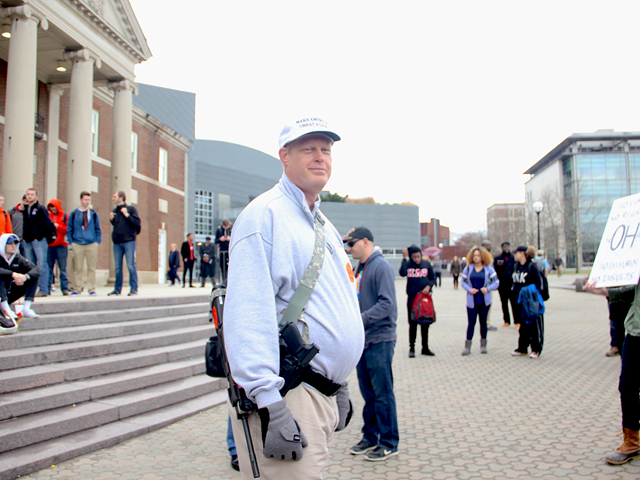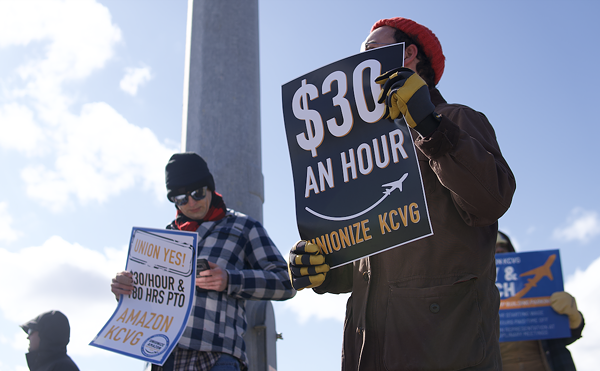Hey, Cincy. There’s plenty of news to be had this morning, so gather round and I’ll start dishing it out.
Well, that escalated quickly. Just over a week after his inauguration, President Donald Trump has once again sparked massive protests, including some in the Greater Cincinnati area. About 100 protesters gathered at the Greater Cincinnati International Airport last night at 6 p.m. to protest Trump’s ban on refugees and travelers from seven Muslim countries, mirroring large protests in New York City, Dallas, Chicago and other major cities.
The executive order Trump signed prohibits travelers from Iran, Iraq, Libya, Somalia, Sudan, Syria and Yemen — all Muslim-majority countries — from entering the United States for 90 days. It also blocks refugees from all countries for 120 days. That ban includes those with valid green cards and visas, leading to the detention of dozens at major international airports like New York’s JFK. No refugees from the seven countries targeted by the ban have killed anyone on American soil, according to numbers from the right-leaning CATO Institute.
• Mayor John Cranley has weighed in on the controversy around Trump’s ban, penning an op-ed in The Cincinnati Enquirer promising that the city will remain welcoming to refugees and other immigrants. The piece specifically mentions Syrian refugees, a group which Cranley said in 2015 should be temporarily stopped from entering the United States.
“Syrians are fleeing unspeakable violence and oppression and their plight should remind us of the ideals etched into the base of our Statue of Liberty,” Cranley wrote in the Jan. 28 editorial. “Of course, Syrian refugees should continue to be properly vetted, but if the United States halts all Syrian refugee settlement, it will ultimately be viewed historically in the same way as the refusal to settle Jews during the Holocaust.”
That’s a big evolution from his previous comments on refugees from Syria.
“I understand the dire circumstances Syrian refugees face because I personally visited a refugee camp in Jordan last summer,” Cranley said in a Nov. 16, 2015 statement that came following terrorist attacks in Egypt and Paris. “However, the federal government should halt its actions until the American people can be assured that exhaustive vetting has occurred.”
Cranley later apologized for those comments after local criticism.
• Even some Ohio Republicans have pushed back against Trump's ban, albeit in a limited way. Ohio Gov. John Kasich and U.S. Sen. Rob Portman both criticized the executive order, saying it wasn’t well thought out and didn’t reflect American values. The ban led to the detention of doctors and other professionals in the United States legally before it was partially and temporarily halted by a federal judge. “This order should be replaced with a more thoughtful approach consistent with our values," Kasich said yesterday. Portman agreed, saying that he supported the federal judge’s stay on the order and that he thinks lawmakers should “take a deep breath and come up with something that makes sense.” Meanwhile, Hamilton County GOP chair Alex Triantafilou has expressed support for the ban, saying it’s “an opportunity to protect the homeland.”
• Meanwhile, hundreds attended a rally Sunday in Mason supporting Rawd Saleh, the Muslim woman we told you about last week who was targeted by a neighbor with flyers falsely claiming she has ties to terror groups. Those flyers had the mother of three’s photograph and address on them and cited 14-year-old charges against her father that have been proven false. Neighbors have rallied around Saleh, organizing the rally in a show of support.
• OK. Time for some non-immigration related news. Let’s head to City Hall for a second, shall we? One of Mayor Cranley’s biggest allies on Council has been conservative Councilman Charlie Winburn, who Cranley has installed as the chair of the powerful Budget and Finance Committee. But, lately, Winburn has expressed concerns that Cranley has been going behind his back and undermining him. Winburn is weighing a race against Cranley as a Republican, causing a schism between the two allies. That puts Cranley in a tough spot: with two Democrat challengers who are African-American, can Cranley afford to battle Winburn, one of his strongest allies in the black community? The mayor has played nice with Winburn so far, perhaps reflecting the sensitive political position he finds himself in.
• Finally, last week we told you about a federal judge’s order that put a stay, once again, on lethal injections scheduled for three Ohio inmates. That order said that the state’s use of the drug midazolam in a three-drug cocktail was unconstitutional because its use has caused prolonged and possibly painful executions in the past. The state would like to go back to using another, more powerful drug called pentobarbital. But the problem is that the drug isn’t readily available — the main manufacturer in Denmark won’t sell it for use in executions — leaving Ohio scrambling to find a source before it can begin executions again.






